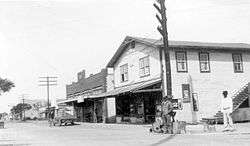Goldsboro, Florida
| Goldsboro Goldsborough[1] | |
|---|---|
| Town | |
|
Goldsborough c.1920 | |
 Goldsboro Location of Goldsboro, Florida | |
| Coordinates: 28°48′03″N 81°16′47″W / 28.8007°N 81.2798°WCoordinates: 28°48′03″N 81°16′47″W / 28.8007°N 81.2798°W | |
| Country |
|
| State |
|
| County | Seminole |
| Incorporated | December 1, 1891 |
| Dissolved | April 26, 1911 |
| Founded by | William Clark |
| Area [2] | |
| • Total | 1.018 sq mi (2.64 km2) |
| Elevation | 35 ft (10.7 m) |
| Population [2] | |
| • Total | 2,537 |
| • Density | 2,751/sq mi (1,062/km2) |
| Time zone | Eastern (EST) (UTC-5) |
| • Summer (DST) | EDT (UTC-4) |
| ZIP code | 32772 |
| Area code(s) | 331 |
Goldsboro is a community and former town in Seminole County, Florida. Founded in 1891, only a few years after Eatonville, it is one of the oldest African-American founded communities in the United States. In 1911, the community was annexed into Sanford, Florida.[1][3][4][5][6][7]
History
The Freedmen's Bureau established Goldboro during the Reconstruction Era[8] for African Americans who worked at local railroad yards, farms, produce house and ice houses. In 1891, residents of Goldboro pursued incorporation of the town, publishing notices in the Sanford Journal as early as October 24, 1891.[9] The town was incorporated at noon on December 1, 1891 by merchant William Clark and 19 registered African American voters. Walter Williams served as Goldsboro's first mayor until 1892.[9][10][11][12] In 1900, the population of Goldsboro was 71. By 1905, the population had increased to 100 people.[13]
In 1911, the community of Sanford Heights seceded from Sanford, because of discord over municipal services provided by Sanford. This added to concerns that Sanford's ability to expand would be constrained by the surrounding towns of Goldsboro, Georgetown and Sanford Heights, as well as Lake Monroe to the north.[14] Florida State Representative and former Sanford mayor Forrest Lake led legislative efforts to curtail Sanford Heights ability to incorporate, independent of Sanford. Goldsboro was also a target in Forrest Lake's annexation process, prompting Goldsboro's leaders to start a letter writing campaign to local newspapers.[14] On April 6, 1911, the Sanford city council passed a resolution to annex Goldsboro and on April 26, 1911 the Florida legislature passed the Sanford Charter Bill, dissolving the incorporation of both Sanford and Goldsboro, and reorganizing Sanford as a city that included Goldsboro within its boundaries.[9][12][15]
Goldsboro's identity slowly eroded after it lost its charter and was annexed. Sanford renamed several of Goldsboro's historically-named streets. Clark Street, named for the town's founder, was renamed Lake Street after Forrest Lake, the man responsible for the loss of Goldboro's status as a town.[9]
Recent history
In 2007, a Public Safety Complex was slated for construction in Goldsboro as part of Sanford's efforts to revitalize the area.[16] In November 2010, the Sanford Police Department was relocated to the new $20 million, 76,000 square feet (7,100 m2) complex on 13th Street, which it shares with the Sanford Fire Department and a five-bay fire station.[17][18]
A historical museum was opened in Goldsboro in 2011, at the site of the original post office. The museum exhibits photographs, historic documents and furniture donated by local residents.[5]
See also
References
- 1 2 Patterson, Tiffany Ruby (2005). Zora Neale Hurston And A History Of Southern Life. Temple University Press. pp. 65, 70,. ISBN 978-1592132904.
- 1 2 "Goldsboro Community neighborhood in Sanford, Florida (FL), 32771 detailed profile". City Data. Retrieved July 24, 2013.
- ↑ Robinson, Jim (September 1, 1991). "Political Sham - The Rise And Fall Of Goldsboro". Orlando, FL. Orlando Sentinel. Retrieved July 19, 2013.
- ↑ Comas, Martin E. (August 5, 2012). "Shattered trust - Trayvon's death fanned Sanford blacks' old fears. Can city heal?". Orlando, FL. Orlando Sentinel. Retrieved July 19, 2013.
- 1 2 González, Eloísa Ruano (November 12, 2011). "New Goldsboro history museum preserves town's forgotten lore". Orlando, FL. Orlando Sentinel. Retrieved July 19, 2013.
- ↑ Parker, Valada; Flewellyn, Parker. African Americans of Sanford. Sanford Historical Society.
- ↑ Robinson, Jim (September 20, 1992). "A Tale Of 2 Cities In Sanford 'S Past Goldsboro And Georgetown Get Credit For Creating A Hub". Orlando, FL. Orlando Sentinel. Retrieved July 20, 2013.
- ↑ Porter, Tana Mosier (Winter 2004). "Segregation and Desegregation in Parramore: Orlando's African American Community". The Florida historical quarterly. 82 (3): 292.
- 1 2 3 4 Bentley, Altermese Smith (2000). Seminole County. Arcadia Publishing. p. 57. ISBN 978-0738506340.
- ↑ Philemon, Cindy I. "The Rich History of Goldsboro". Goldsboro Historical Museum of Sanford, Florida. Archived from the original on June 25, 2013. Retrieved July 19, 2013.
- ↑ Brown, Canter (1998). Florida's Black Public Officials, 1867-1924. University Alabama Press. pp. 40, 74, 80, 94, 100, 126, 140, 171, 176–177. ISBN 0817309152.
- 1 2 Robinson, Jim (December 15, 2002). "Grapeville Details Emerge - The Histories Of The Swedish Colony And The Goldsboro Area Are Intertwined". Orlando, FL. Orlando Sentinel. Retrieved July 20, 2013.
- ↑ "The third census of the state of Florida taken in the year 1905". University of Florida. 1906. p. 185. Retrieved July 25, 2013.
- 1 2 Imperiale, Nancy (May 20, 1990). "Discovering A Lost City Historian Finds Surprising Past Of The Goldsboro Community". Orlando, FL. Orlando Sentinel. Retrieved July 19, 2013.
- ↑ General Acts and Resolutions Adopted by the Legislature of Florida. State of Florida. 1911. pp. 497–498.
- ↑ Hendricks, John (June 13, 2007). "Safety complex could spur 13th Street growth". Sanford Herald. Retrieved July 20, 2013.
- ↑ Roberts, Gary (November 1, 2010). "Moving day for police and fire". Sanford Herald. Retrieved July 20, 2013.
- ↑ Lee, Trymaine (July 12, 2013). "In black Sanford, a place to gather and wait for a verdict". MSNBC. Retrieved July 20, 2013.
External links
- Goldsboro Historical Museum
- Goldsboro Collection -RICHES Mosaic Interface
